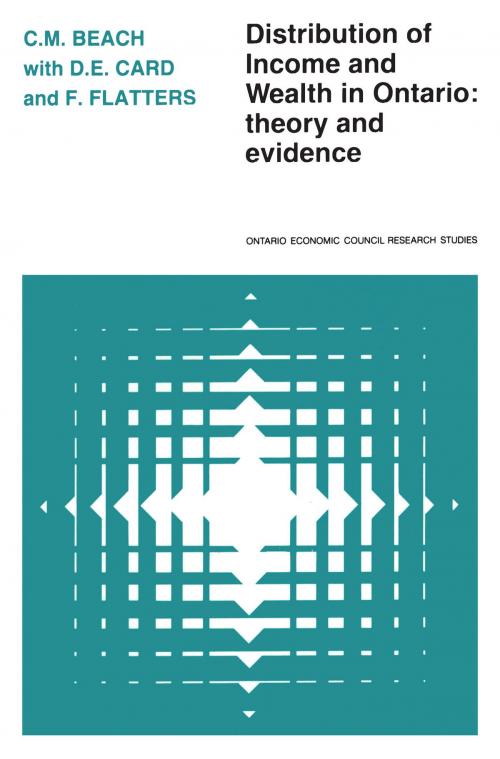Distribution of Income and Wealth in Ontario
Theory and Evidence
Business & Finance, Economics, Statistics, Economic Conditions, Finance & Investing, Finance| Author: | Frank Flatters, Charles Beach, David Card | ISBN: | 9781442633384 |
| Publisher: | University of Toronto Press, Scholarly Publishing Division | Publication: | December 15, 1981 |
| Imprint: | Language: | English |
| Author: | Frank Flatters, Charles Beach, David Card |
| ISBN: | 9781442633384 |
| Publisher: | University of Toronto Press, Scholarly Publishing Division |
| Publication: | December 15, 1981 |
| Imprint: | |
| Language: | English |
Distribution analysis has advanced remarkably in recent years, and this is a valuable application of its principles to a Canadian context. The book provides an extensive survey of recent literature and a new source of income and wealth distribution data for Ontario, drawn from newly available microdata sets. It also presents an evaluation of the data as a basis for measuring inequality in the distribution of economic and well-being.
The empirical results illustrate how incomes vary significantly with age according to labour market attachment and experience, educational attainment and occupation, transfer receipts, and investment benefits. Similarly, strong age effects on net worth account reflect life-cycle patterns in asset holdings and debts typically associated with family investment in housing and financial adjustments for retirement. Differences in family size and composition have a substantial effect on the structure of family economic well-being. The inequality effects of adjusting for accrued capital gains and net worth holdings can also be quite significant. It is found that the distributional effects of CPP net benefits are considerable, although they are not as equalizing as one may have expected because of marked cohort effects.
The detailed findings suggest that the life-cycle framework is a very useful one for evaluating the distributional effects of certain government programs, particularly intertemporal ones, and they underline the need for a range of different types of policies to address low income problems. The study urges greater recognition of the inequality of treatment and opportunity among different groups of the population. It also points out that conventional income distribution figures are only very imperfect estimates of the state of inequality in the underlying distribution of economic well-being.
Distribution analysis has advanced remarkably in recent years, and this is a valuable application of its principles to a Canadian context. The book provides an extensive survey of recent literature and a new source of income and wealth distribution data for Ontario, drawn from newly available microdata sets. It also presents an evaluation of the data as a basis for measuring inequality in the distribution of economic and well-being.
The empirical results illustrate how incomes vary significantly with age according to labour market attachment and experience, educational attainment and occupation, transfer receipts, and investment benefits. Similarly, strong age effects on net worth account reflect life-cycle patterns in asset holdings and debts typically associated with family investment in housing and financial adjustments for retirement. Differences in family size and composition have a substantial effect on the structure of family economic well-being. The inequality effects of adjusting for accrued capital gains and net worth holdings can also be quite significant. It is found that the distributional effects of CPP net benefits are considerable, although they are not as equalizing as one may have expected because of marked cohort effects.
The detailed findings suggest that the life-cycle framework is a very useful one for evaluating the distributional effects of certain government programs, particularly intertemporal ones, and they underline the need for a range of different types of policies to address low income problems. The study urges greater recognition of the inequality of treatment and opportunity among different groups of the population. It also points out that conventional income distribution figures are only very imperfect estimates of the state of inequality in the underlying distribution of economic well-being.















